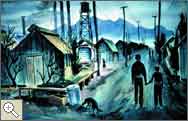|
|
 |
 |
 |
|
History: Whose Story |
|
Introduction
-
Step One
-
Step Two
-
Step Three
-
Step Four
-
History:Whose Story
|
 |
 |
 |

Retired engineer Richard "Babe" Karasawa works as a volunteer at the Japanese American National Museum in Los Angeles. He grew up in San Diego and was sent to the camps at Santa Anita and Poston, but he did not know of the Miss Breed letters until a few years ago, when the museum received the collection as a gift. While helping to organize the collection, he discovered that he knew many of the writers. David Kikuchi, who wrote the letter on this page, is still a friend of his.
Babe was fourteen at the time of the evacuation; David was nine. Both of them lived in converted horse stables at Santa Anita. One of Babe's most powerful memories is the moment when he and his family were shown their new home, which still smelled of the horses.
"My mom sees it and tears start coming down her face," he said. "My mom says, 'We're not going in there.'"
Babe was in a special position when he worked on the letters. He read them as history, but a history that was part of his own life.
"I was looking for reminders of what things were like," he said. What he found was "a definite inclination not to tell the worst." David's letter sums up the housing at Santa Anita in one statement: "We live in horse stables but there is another room added to the horse stable." Babe laughed when he read this, because it came so far short of describing all that he remembers.
"Many of us found it very difficult to clearly express our emotions," he said. "Generally speaking, we were quiet Americans. I think the tendency was to minimize complaints to anyone outside of our community."
But David Kikuchi, a retired architect, doesn't see it this way at all. His memories of camp life are mostly happy ones. Hikes to the nearby Colorado River and days spent fishing are what stand out in his thoughts of Poston. For him, the internment was "a great adventure" — a long camping trip with his family and all his friends along.
"Maybe it shouldn't have happened, but it did," he said. "Most of us did the best with what we had. There was no sugarcoating at all in those letters."
Both Babe and David say that many factors — including the difference in their age — account for their very different experiences. Can any one person, then, speak for others who were at Poston? If two people can have such different interpretations of the letters, can there be any one way to interpret them?
Before you write about the Miss Breed letters, try to find a piece of your own writing from the past—a school essay on a personal subject, maybe, or a journal entry. Look at it as a historical document. Does it seem to be a truthful and full account of your thoughts on the subject? If not, why not? Did you write in a certain way to suit the teacher or other readers? Did you leave things out for any reason?
|
 |
 |
 |
 |

Poston by Harry Yoshizumi.
|
 |
 |
 |
|




|
|
|

